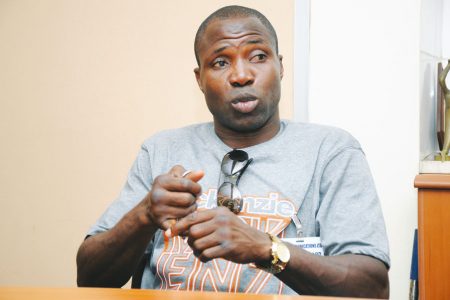At no time, in the last fourteen months of his sojourn in the United States of America, has the reality of his status as an undocumented immigrant—and the helplessness it connotes—been more apparent to Joel (not real name) than now. A resident of Houston, Texas, Joel, from Nigeria, works in a car maintenance company in the city. It’s a job he secured three months after arriving Houston from Nigeria, and while it’s a completely different work from what he held in Nigeria, Joel has since taken it in his stride and adjusted to life in his new environment, believing it to be a temporary job that should lay the foundation for a better life in America in no distant time. But then emerged the coronavirus disease and Joel’s car maintenance work currently hangs in the balance following directives by American authorities to residents in many states to stay and work from home.
The coronavirus disease, which origin is traceable to Wuhan, Hubei Province, China, where it claimed many lives, and within weeks, beginning December, spread to various countries around the world, including Italy, South Korea, Spain, Germany, France, UK, South Africa, Kenya, Nigeria, USA, accounts for the death, as at March 26, of 21,031 persons worldwide according to the World Health Organisation(WHO). Overall, 199 countries/areas or territories are currently affected by the disease described by some analysts as the deadliest health challenge in living memory. Like many people around the world, Joel kept abreast of developments regarding the coronavirus pandemic as the WHO described it but the impact came closer home for him when Gregory Abbott, governor of Texas, on March 19 issued a directive that prohibited certain businesses like restaurants and bars from fully operating in the state in a bid to limit human contact that contributes to the spread of the virus.
That order was soon followed by another from the mayor of Houston, Sylvester Turner and Harris County Judge, Lina Hidalgo asking residents to stay and work from home until April 3, except if their work or business was “essential” to the public. Among such essential businesses are grocery stores, pharmacies, gas stations, transport, telecom, energy and financial services. Those who refuse to comply, Hidalgo warned, risk being prosecuted. Following Turner and Hidalgo’s directive, Joel decided to heed the order as patronage had already significantly reduced at his work place following Abbott’s, and, earlier, President Donald Trump’s address to the nation discouraging large gatherings.
The implication is that Joel would earn no money for as long as the stay at home order subsists. His situation is different from that of many Americans, green card holders or others with legal permits that Trump seeks to assist in the coming days with a financial package. Just as the coronavirus is described as the deadliest health catastrophe in living memory, Trump’s rescue plan, is considered by The Economist magazine, as the “largest fiscal stimulus in modern history,” which “provisions—including bail-outs for firms both big and small, expanded unemployment-insurance benefits and a straight cash transfer to many Americans—are expected to cost close to $2trn, roughly one-tenth of GDP.” Each individual beneficiary, from reports, could pocket between $1,000 to $1,200, while a family of four, for instance, could receive up to $3,000 as entitlement while those who lost their jobs or were laid off as a result of the pandemic will be paid their wages for a period of time.
Since news of the financial bailout, endorsed by Congress and signed into law by Trump on March 27, became public knowledge, Joel found out there’s no provision in the stimulus package for people like him who are yet to formalize their stay in the country. Noting that he didn’t expect to be handed free money, particularly in a country where the President has repeatedly made it clear that he’s not welcome, the Nigerian said he’s struck by the reality that he simply doesn’t count in crisis moments like this all due to circumstance of birth or situation. Sharing the same fate with him in his workplace are two other undocumented Africans like him as well as a Mexican immigrant. All four of them are currently at home, like millions of others whose jobs were affected across the country by the coronavirus pandemic.
Before now, immigrants in the US, almost on a daily or weekly basis, used to be part of the news staple, as the Trump administration unfolds plans in response to migrant inflow into the country or gets rebuked for its policies. Not anymore. The coronavirus disease is the term now on everyone’s lips. Migration comes to the fore these days mainly in relation to the coronavirus scare and ways to check it, like the plan by US and Mexican authorities to work together to stem migrants movement to the US through the Mexican border.
According to reports, there are an estimated 11 or more million undocumented immigrants in the U.S, many of who work in sectors mostly impacted by the pandemic. They constitute a workforce the Economist say could be most affected by the crisis.
According to the Economist, “cruelly, those likeliest to lose income or their jobs” in the US from the coronavirus pandemic “are in more precarious, less well-paid industries—restaurant staff (of which there are 9.6m), retailers (8.8m) or hotel workers (2m). If they lose their jobs, the effects will ripple through the economy.”
Yasin Kakande, a US based Ugandan journalist and author, in answer to the reporter’s question, said that while the Trump administration has been good to count the “benefits the undocumented migrants bring to the country through the provision of cheap labour in agriculture, hospitality and even the health sector where thousands of undocumented migrants work as caregivers, when it comes to rewarding them for their contributions, the administration has acted like it does not recognise this category of workers existed.” Yasin added that “most migrants especially the undocumented do not have the social security benefit that is expected to come from the state’s emergency relief fund soon. This means they will still struggle to pay their bills especially for rent and utilities.”
As difficult as the times might be, however, Yasin pointed out that not everyone turns their back on people in crisis times, irrespective of their immigration status.
“There are a couple of refugees and immigrant charities that are still helping regardless of one’s immigration status. I would advise undocumented migrants to reach out to these charities in their own communities for some help,” he said.


